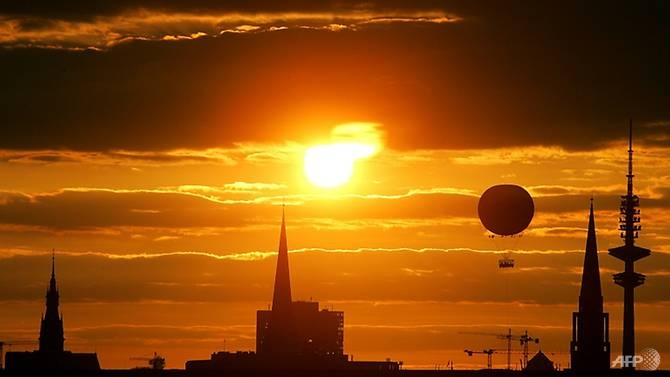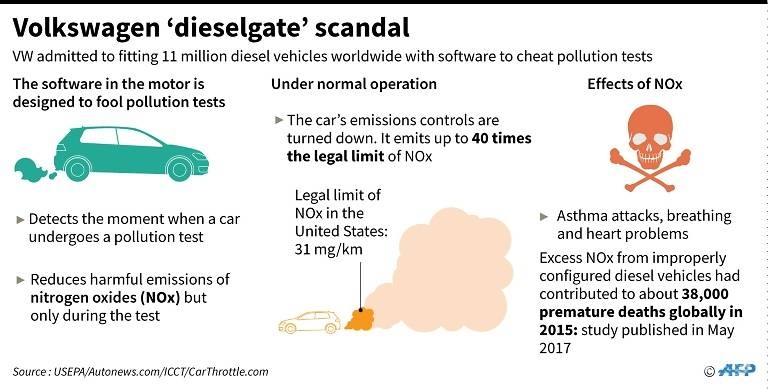Germany clings to diesel, even as first driving bans hit
 |
| Hamburg will become the first city to ban older diesel vehicles from some of its highly polluted roads. (Photo: AFP/Odd Andersen) |
A 1,600-metre stretch of highway and a 580-metre section of another major road will be closed to older diesels.
The port city is the first to act on a court ruling that found such bans were a legitimate way for local authorities to reduce air pollution below European Union health thresholds.
Judges at the Federal Administrative Court found in February that cities could "gradually" eliminate diesel vehicles, starting with the oldest, while allowing exceptions including for emergency services, local residents and businesses.
"Germany has to do something" to improve air quality, said 37-year-old Sabine, who works on the Max-Brauer Allee, one of the roads hit by the ban.
"We should abolish diesels," she added.
Diesel was long seen by Germans as a proudly homegrown technology that could help battle climate change, with lower emissions of greenhouse gas carbon dioxide (CO2) than petrol motors.
Patented by Bavarian engineer Rudolf Diesel in 1892, the fuel is subsidised to this day in a number of European countries.
But its reputation has lain in tatters since Volkswagen's "dieselgate" scandal broke in 2015.
LIP SERVICE
The mammoth carmaker admitted to fitting millions of cars worldwide with "defeat devices" - software designed to trick regulators into thinking cars met emissions standards.
In fact, output of harmful fine particulates and nitrogen oxides (NOx), which can cause respiratory and heart diseases, was far higher than legally permitted.
Drivers have voted with their wallets ever since, sending diesel's share of new car sales plunging from 47.7 per cent in 2015 to 38.7 per cent last year.
Nevertheless, Germany's federal government under Chancellor Angela Merkel has often appeared to take the car industry's side.
It has pushed back against diesel bans and rejects the idea of a "blue badge" drivers could stick on their windscreens that would identify the least polluting vehicles.
 |
| Graphic on the Volkswagen emissions cheating scandal. (Image: AFP) |
Instead, Berlin has offered longer-term measures like a cash pot to extend public transport and build up cities' electric vehicle fleets.
"That makes measures like those in Hamburg "just lip service from the politicians ... I don't think it will actually affect anything" said Felix Fischer, 49, who works in a bicycle shop on the Stresemannstrasse highway - the other stretch to be closed to diesels.
Some media have dubbed leader Merkel the "Autokanzlerin" or car chancellor, playing on her concern to protect a critical sector for the German economy.
DIESEL "A GERMAN CHILD"
With some 600,000 jobs dependent on the internal combustion engine according to estimates from the Ifo economic institute in Munich, the chancellor's centre-left coalition partners are just as concerned as Merkel's conservatives to keep the technology alive.
Many such jobs would not be replaced if the industry switches to less mechanically complex electric power en masse.
Consulting firm SMP found firms can produce around 350 combustion engines per worker per year, a figure that rises to 1,600 for electric drivetrains.
Diesel is "a German child that we'd rather not allow to die", said Stefan Bratzel of the Centre of Automotive Management.
Bosch, the world's biggest auto components supplier, trumpeted in April new technologies it claimed could "drastically" reduce diesel emissions and "put a stop, once and for all, to the debate about the demise of diesel technology".
But the long-term effect of government and business prevarications could actually be to undermine the German car industry, argued Ferdinand Dudenhoeffer of the Centre for Automotive Research.
"The longer you wait, the harder it will be to make the transition to electric," he warned.
What the stars mean:
★ Poor ★ ★ Promising ★★★ Good ★★★★ Very good ★★★★★ Exceptional
 Tag:
Tag:
Related Contents
Latest News
More News
- Russian President congratulates Vietnamese Party leader during phone talks (January 25, 2026 | 09:58)
- Worldwide congratulations underscore confidence in Vietnam’s 14th Party Congress (January 23, 2026 | 09:02)
- Political parties, organisations, int’l friends send congratulations to 14th National Party Congress (January 22, 2026 | 09:33)
- 14th National Party Congress: Japanese media highlight Vietnam’s growth targets (January 21, 2026 | 09:46)
- 14th National Party Congress: Driving force for Vietnam to continue renewal, innovation, breakthroughs (January 21, 2026 | 09:42)
- Vietnam remains spiritual support for progressive forces: Colombian party leader (January 21, 2026 | 08:00)
- Int'l media provides large coverage of 14th National Party Congress's first working day (January 20, 2026 | 09:09)
- Vietnamese firms win top honours at ASEAN Digital Awards (January 16, 2026 | 16:45)
- ASEAN Digital Ministers' Meeting opens in Hanoi (January 15, 2026 | 15:33)
- ASEAN economies move up the global chip value chain (December 09, 2025 | 13:32)






















 Mobile Version
Mobile Version